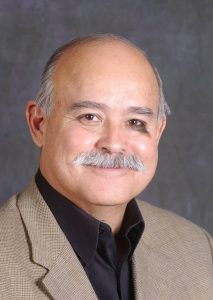|
Only have a minute? Listen instead
Getting your Trinity Audio player ready...
|

Local leaders are remembering the life of a man who kicked open the door of opportunity for Latino men and women in the Rio Grande Valley.
Juan Maldonado died on July 5 at the age of 78, but his impact continues to resonate with South Texas residents and many who hold public office.
“There’s so much to tell. Mr. Maldonado held many positions in his lifetime. He was an activist and a political leader, as well as a proud Latino,” Selina Medrano, vice president of the Hidalgo County Tejano Democrats, said about her friend and mentor. “Everything that he did in his lifetime was to create opportunities for Latinos, and to empower Latino involvement.”
Medrano saw Maldonado as not only a mentor but also a close friend. She compared her conversations with him to taking a course with a college professor. She said that his loss leaves a big void in her life.
Maldonado was born in San Juan at a time when segregation was still prevalent in the Rio Grande Valley. It was the lack of Hispanic representation in public office that inspired Maldonado to get involved with various organizations to help empower Mexican-Americans.
“Many Hispanic elected officials and leaders stand on his shoulders,” Medrano said. “I think he did the work that allowed for that advancement earlier than it would have come without him. It’s a great loss to this region. He changed the trajectory of Hispanics in our region in his young adulthood.”
“It’s because of him that we were able to make the advancements we made as early as we made them,” she continued. “He gave many Latinos a place to go to for strength and support. And I don’t think that that was there before.”
He was part of the first majority-Hispanic San Juan city commission in 1971 when he was in his early 20s. He would go on to serve as mayor from 1977 to 1981.
“He was part of the first Hispanic commission ever in the Valley,” Medrano said. “They were the first to have the full commission be Hispanic. It had never been done. That was a big deal because it was a rarity at the time.”
“He was part of a coalition, a group called Raza Unida,” said current San Juan Mayor Mario Garza. “He was known back then, before our time, that he was one of them spearheading this coalition and going out there advocating for us Hispanics and Latinos to get involved and to come out and vote and the importance of voting.”
Garza, who read a proclamation on behalf of the city of San Juan during Maldonado’s wake Wednesday, said that Maldonado was a mentor for him early on in his political career.
“He was very supportive of the cause, and he’s always stood by me,” Garza said. “I was always going to him for advice. He mentored me, and if I had any questions I went straight to him. For anything having to do with the past, he was also our local historian. He knew everything about the city of San Juan, pretty much. So if anybody had any questions in regard to the history, they would go straight to Mayor Juan Maldonado and he would have the answers for us.”
Maldonado’s encyclopedic knowledge of his hometown history was likely supplemented through his first-hand experience not only in public office, but as an activist and instigator who demanded equal and fair opportunities for his fellow Mexican-Americans.
“He was very involved because he wanted the people, his community, to have a voice — to have a voice in government, in education, and in social services,” Hidalgo County Judge Richard F. Cortez said. “If you want some things to happen, you have to work hard at it. Juan was willing to do that. He was a leader of several groups and movements of young Hispanic men back in the day. I think his values were very good. He valued family education and hard work.
“He didn’t want a handout, he wanted an opportunity.”
Maldonado’s death was preceded by that of another public servant who devoted his career to bettering his community, former Cameron County commissioner, county judge and Texas Secretary of State Carlos H. Cascos, who died on June 26. Cortez said that he hopes that their work will inspire the next generation of leaders.
“My hope is that we have young people that are waiting in line to step up and serve the community,” Cortez said. “Serving the community means that you give your time and talents and sometimes money to help people. We should be in the business of helping people because what defines your community is what we do for one another.”



